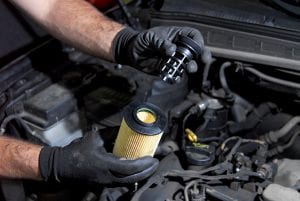Stop start technology in vehicles was invented due to a mix of environmental, engineering and regulatory pressures. Before then, standard car batteries couldn’t cope with the demands of stopping and starting the engine quickly, especially while stuck in traffic.
It’s always useful to learn more about how your vehicle works, including why certain functions were invented. That’s because the more you understand about your car or van, the easier it will be to take the best care of it.
In today’s post, the Filter Services UK team is here to shed light on what a stop start battery is and how it works to guide you.
Stop Start Batteries: An Overview
A stop start battery is a specific type of car battery which has been designed for vehicles that have stop start technology.
Simply put, a stop start battery will automatically shut off the engine when the car isn’t moving, i.e. when at the traffic lights. As soon as the driver presses the clutch or releases the brake, the engine will restart.
Not all car batteries are created equal, and for a stop start battery to work, it needs to be stronger and more durable than a standard car battery. This is because a stop start battery needs to restart the engine many more times than a traditional car battery. Also, it needs to recharge quickly when the engine restarts, while also continuing to power electric systems while the engine is off.
There are a couple of types of stop start batteries available, including:
EFB (Enhanced Flooded Battery) – Used in small to medium cars with simpler stop start systems. More robust than a normal lead acid battery but cheaper than AGM.
AGM (Absorbent Glass Mat) – Found in higher spec stop start cars (often with lots of electrics, like heated seats or infotainment). Can handle deeper discharges and faster recharging. It lasts longer but costs more.
Why use a Stop Start Battery?
Stop start batteries were invented because standard car batteries weren’t designed for frequent stopping and starting. Therefore, the technology was developed to reduce emissions, improve fuel economy and help manufacturers comply with UK/EU regulations, all while keeping cars reliable in modern city traffic.
So as a driver, it stands to reason that you will benefit from these incentives, including improving fuel efficiency when you’re in heavy traffic. Crucially, by using a dedicated stop start battery, your engine will be best prepared for continual stopping and starting, which isn’t the case with standard car batteries.
Stop Start Batteries and your Vehicle Filters
At Filter Services UK, we specialise in all things vehicle filters. While a stop start battery doesn’t directly touch or sit inside any of the vehicle’s filters (air, oil, fuel or cabin), it can indirectly affect how filters perform. That’s because a stop start system changes how the engine operates.
For instance, a stop start battery can indirectly increase oil filter demands due to repeated pressure cycles. It can also affect air filter clogging, while making the fuel system cleanliness even more important to enable smooth restarts.
Keeping on top of oil changes and the choosing correct battery is key in stop start vehicles. However, it’s also important not to neglect your vehicle filters!
So, based on the different types of vehicle filters, this is what to look out for if you have a stop start battery:
Oil Filters
As we’ve established, a stop start battery means the engine shuts off and restarts more often. Each restart moves oil through the system again, so the oil filter may see more frequent pressure changes. If oil isn’t circulating well (i.e. due to poor quality oil or a clogged filter), frequent restarts could accelerate engine wear. That’s why manufacturers often recommend higher spec oils and filters for stop start cars.
Air Filters
Frequent restarting in traffic (especially urban driving) may expose the air filter to more short bursts of intake air mixed with dust, soot and pollutants. This is a minor effect, but over time, it can mean the air filter clogs a little faster in city use compared to steady motorway driving.
Fuel Filters
Stop start systems reduce idle time, which in theory should slightly reduce the load on the fuel system. However, frequent restarts mean the fuel pump primes more often, so a dirty fuel filter could cause harder starting. A healthy battery helps the pump run at the proper speed, ensuring clean fuel delivery through the filter.
Cabin/Pollen Filters
When the engine shuts off in stop start mode, the blower may keep running from the battery.
This means air still passes through the cabin filter even when the engine is off, especially if the climate control is on. A weak battery might cause the blower to cut off earlier.. The filter itself isn’t damaged, but it is used more often in stop start cycles.
Have a Stop Start Battery? Ensure your Vehicle Filters are up to Scratch
If your personal or company vehicles have stop start batteries, then it’s key to understand how this different technology can impact other areas within the vehicle.
Filters play an important role in maintaining the health of your vehicle, especially if you have a stop start battery. So if it’s time to replace any of your filters, you’re in exactly the right place!
Simply head over to our filters page to view our available stock.
Filter Services is based in Chesterfield with additional locations in Leeds and Leicester.
For any help or enquiries, please send us a message or give us a call on 01246 802 822.
